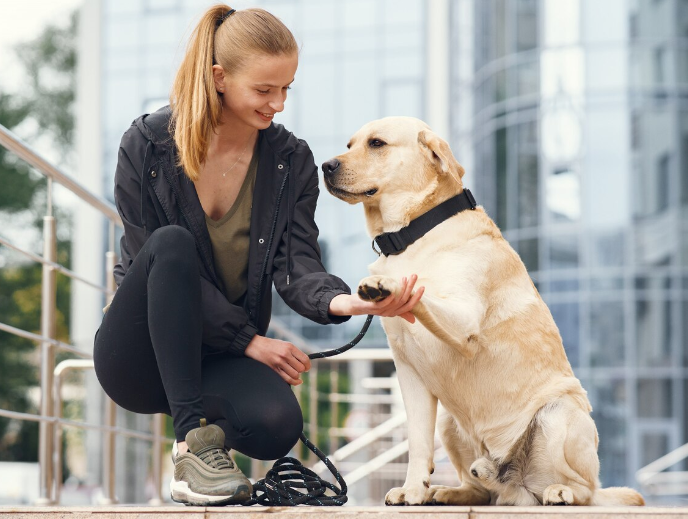- Can You Visit a Hotel With Your Service/Assistance Dog?
- Can a Hotel Charge You Fees Due To Your Service/Assistance Dog?
- In What Cases Can You Be Charged Due to the Presence of a Service/Assistance Dog?
- How Can Hotel Employees Verify the Legitimacy of Your Service/Assistance Dog?
- Can You Be Asked to Show Documentation for Your Service Dog?
- Can Dog Allergies Justify Excluding a Service/Assistance Dog from a Hotel?
- Laws that Service/Assistance Dog Teams Can Rely On
- The Americans with Disabilities Act (ADA) - United States
- The Equality and Human Rights Commission - United Kingdom
- Accessible Transportation for Persons with Disabilities Regulations- Canada
- Service/Assistance Dogs vs Emotional Support Animals

It takes time to plan a good family vacation, and by “family”, we also mean our paw friends! While traveling with a pet dog can be challenging enough, traveling with a service/assistance dog can be even more stressful if proper preparation has not been done in advance.
To avoid negative situations as a handler and prevent your trip from becoming an emotional roller-coaster filled with negative emotions due to the presence of your service dog, you should familiarize yourself with service/assistance dog regulations, as well as the rights and responsibilities of service/assistance dog teams.
How to communicate your rights and needs as a part of a service/assistance dog team when at a hotel; and whether or not you can be charged fees due to the presence of your support animal, is a topic we will discuss today!
Before we continue with our article, we will make a quick note- you will notice the term “service/assistance dogs” used throughout the entire text. “Service dogs” is the term that is primarily used in North America, while “assistance dogs” is mainly used in Europe.

Are
Service/Assistance Dogs Pets?
No! Service/assistance dogs are dogs who are individually trained to do specific tasks for the benefit of an individual with a physical and/or mental disability. The trained tasks must be in direct relation to the person’s disability. Service/assistance dogs are considered a medical necessity and not pets.
Having said that, they are not subject to any hotel fees that may apply to pets.
Can You Visit a Hotel With Your Service/Assistance Dog?
You are legally permitted to visit public places, including hotels, with your trained service/assistance dogs. You can not be denied access to the premises or any services or products that are offered to the public.
However, there might be some exceptions to this rule, which include swimming pools or religious institutions.
Based on your location, different laws will apply and ensure your and your service/assistance dog’s rights are protected!

Can a Hotel Charge You Fees Due To Your Service/Assistance Dog?
Hotels can not charge you any fees due to the presence of your service/assistance dog. This would be considered a violation of your rights as an individual with a disability who benefits from the support of an assistance animal.
Additionally, hotel employees can not make presumptions of how they might behave and deny access to them solely on these presumptions.
In What Cases Can You Be Charged Due to the Presence of a Service/Assistance Dog?
Fees will apply if your dog misbehaves and causes disruptions, including but not limited to jumping on hotel guests and passersby, excessively sniffing for food, seeking attention, barking (we exclude barking as a part of the tasks that the dog might have been trained to do to assist their owner), eliminating at the premises in an unsanitary manner, etc.
Also, you should ensure the dog is under control at all times and not leave them unattended.
If the presence of a service/assistance dog results in a fundamental alteration of the nature of the offered goods or services, employees can ask the dog to leave the premises. However, in the context of allowing service/assistance dogs at hotel premises, this is unlikely to occur.
You should not forget, though, that the hotel rules that apply to the other guests, are valid for you too. Having said that, you should always keep in mind that your service/assistance dog is your responsibility.
How Can Hotel Employees Verify the Legitimacy of Your Service/Assistance Dog?
According to the Americans with Disabilities Act (ADA), there are two questions that employees are allowed to ask you to verify the legitimacy of your dog as a service dog:
1. Is this a service dog due to a disability?
2. What tasks has the dog been trained to do?
You should be able to explain what specific tasks/ work your dog does for you to assist you in your daily life. Make sure to explain these clearly in your own words, and avoid answers like “My dog helps me with my anxiety” which might be considered vague and insufficient.
Can You Be Asked to Show Documentation for Your Service Dog?
The ADA specifically states that “Staff cannot ask about the person’s disability, require medical documentation, require a special identification card or training documentation for the dog, or ask that the dog demonstrate its ability to perform the work or task”.
However, in certain cases, employees may doubt the legitimacy of your dog as a service/assistance dog, especially if the tasks they provide are not apparent, for example, if your dog is a Psychiatric Service/Assistance Dog. Being able to present a medical letter as proof of your need for a service/assistance animal can help you avoid potential issues with employees.
It is important to clarify that a medical letter should not disclose any personal information, especially information related to your disability. It serves as proof only that a licensed health professional is familiar with your condition and recommends the use of a service/assistance dog as a part of your treatment.
It is also essential to mention that according to local laws, your service/assistance animal may need to undergo training provided by a specific organization and wear identification issued by that organization.
While self-trained service/assistance animals are recognized in many countries, such as the US and the UK, others require training through organizations like Assistance Dogs International or accredited local entities. Additionally, service animal regulations may differ at a provincial level, as is the case in Canada. For more detailed information on service animal laws at a local level, please refer to the article below.
Can Dog Allergies Justify Excluding a Service/Assistance Dog from a Hotel?
No! Allergy to dog fur/dandruff is not considered a sufficient reason for a service/assistance dog to be denied access to public places, including hotels.
If the other guests are allergic to dogs, hotel staff should offer the so-called “reasonable accommodation” to any service/assistance dog teams on the premises. This could include accommodating them in separate areas or assigning them a non-allergic staff to serve them.
Similarly to allergies to dogs, fear of dogs can not justify the exclusion of a service/assistance dog too.

Laws that Service/Assistance Dog Teams Can Rely On
Based on the specific country/province/area, different laws will govern the rights and responsibilities of service/assistance dog teams. Therefore, understanding the legal framework of your location is crucial for compliance and understanding your rights and responsibilities.
We will list below several laws valid for different locations, governing the status of service dogs.
The Americans with Disabilities Act (ADA) - United States
Under the ADA “State and local governments, businesses, and nonprofit organizations that serve the public generally must allow service animals to accompany people with disabilities in all areas of the facility where the public is allowed to go”.
You can read the full text on the ADA website, the FAQ section.
The Equality and Human Rights Commission - United Kingdom
According to the information listed on the website of the commission:
“Disabled people who use assistance dogs quite often experience discrimination that prevents them from doing everyday things other people take for granted.
This is because shops, restaurants, and other businesses sometimes object to assistance dogs being brought onto their premises. If this happens, the effect is to deny the disabled person the opportunity to buy goods or use services in the way other people do.
Potential consequences include losing valuable business and risking claims of disability discrimination, which could result in financial compensation”.
You can read the full text on the website of the Commission, Assistance dogs: A guide for all businesses
Accessible Transportation for Persons with Disabilities Regulations- Canada
According to the information listed on the government website: “51 (1) A carrier must, on the request of a person with a disability who needs to travel with a service dog, accept the service dog for transport and permit the animal to accompany the person on board, subject to subsection (2).”
You might want to read the full text regarding Accessible Transportation for Persons with Disabilities Regulations.
While dog owners in the US and UK are legally permitted to train their own pet dogs as service/assistance animals, regulations in Canada vary on a provincial level. We would advise you to be aware of these in advance. The information listed on the following pages below might be helpful:
Some provinces like British Columbia, Ontario, and New Brunswick do not require service dogs to be certified by internationally recognized organizations like ADI; other provinces like Quebec do not have specific service dog laws; provinces like Alberta require self-trained service dogs to go through additional evaluation with an accredited local school to be recognized on its territory.

Service/Assistance Dogs vs Emotional Support Animals
While Service/Assistance Dogs are individually trained to do specific work directly related to a person’s disability, Emotional Support Animals (ESAs) provide comfort and companionship only. They do not undergo specialized training and are considered pets in public.
Having said that, hotels that run a “no pets” policy are allowed to charge you fees due to the presence of an ESA.
We would like to advise you to always review local laws in advance, inform employees about your intention to bring a service/assistance dog to the premises, and make sure to friendly but firmly communicate your and your dog’s rights as a service/assistance dog team!













